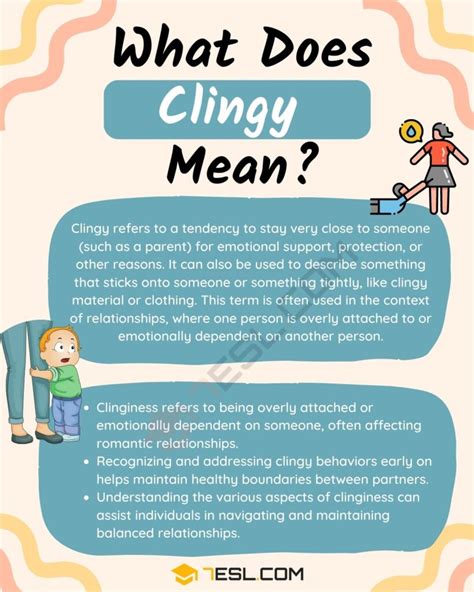Clinginess in relationships refers to a pattern of excessive dependence, neediness, and insecurity exhibited by one or both partners. It is characterized by behaviors that seek constant reassurance, attention, and validation from the other person. Clingy individuals may have difficulty spending time alone, becoming anxious or agitated when separated from their partner.

Understanding the Signs of Clinginess
Identifying clinginess in relationships is crucial for maintaining a healthy and balanced partnership. Here are some common signs:
-
Constant Need for Attention and Reassurance: Clingy partners often require excessive attention and reassurance to feel secure in the relationship. They may frequently text, call, or message their partner throughout the day, seeking constant updates and validation.
-
Difficulty Spending Time Alone: Clingy individuals struggle with spending time alone. They experience anxiety and discomfort when separated from their partner, and may make constant excuses to avoid being apart.
-
Excessive Dependence: Clingy partners rely heavily on their partner for emotional support and well-being. They may lack self-sufficiency and have difficulty making decisions without their partner’s input.
-
Possessiveness and Jealousy: Clingy individuals exhibit possessive behaviors and excessive jealousy. They may become suspicious of their partner’s interactions with others and may try to restrict their social activities.
-
Fear of Abandonment: Clingy partners often have a deep-seated fear of abandonment. They may overreact to perceived threats and become clingy as a way to prevent their partner from leaving.
Causes of Clinginess
Clinginess in relationships can have various causes, including:
-
Low Self-Esteem: Individuals with low self-esteem may cling to their partner for reassurance and a sense of worth.
-
Past Experiences: Negative experiences in previous relationships, such as abandonment or betrayal, can contribute to clinginess.
-
Attachment Styles: People with insecure attachment styles, which develop in childhood, may exhibit clingy behavior in relationships.
-
Personality Traits: Certain personality traits, such as anxiety and neuroticism, can predispose individuals to clinginess.
Consequences of Clinginess
Clingy behavior can have detrimental effects on relationships. It can lead to:
-
Stress and Anxiety: Clinginess can cause stress and anxiety for both partners. The clingy partner may feel anxious when separated from their partner, while the other partner may feel suffocated by the constant attention.
-
Damage to Trust: Excessive dependence and neediness can erode trust in relationships. The non-clingy partner may begin to resent the constant demands for attention and reassurance.
-
Increased Relationship Conflict: Clinginess can lead to frequent arguments and conflict in relationships. The clingy partner’s behaviors can trigger feelings of resentment and frustration in the other partner.
-
Diminished Self-Worth: Clingy behavior can reinforce negative self-esteem in both partners. The clingy partner may become dependent on their partner for a sense of worth, while the non-clingy partner may feel pressured to constantly provide reassurance.
Overcoming Clinginess
Addressing and overcoming clinginess in relationships is essential for creating a healthy and fulfilling partnership. Here are some strategies:
-
Build Self-Esteem: Clingy individuals need to work on improving their self-esteem. This can involve engaging in self-care activities, setting realistic goals, and practicing self-compassion.
-
Challenge Negative Thoughts: Clingy partners often have negative thoughts and beliefs about themselves and their relationship. Challenging these thoughts and replacing them with positive ones can help reduce anxiety and insecurity.
-
Develop Healthy Coping Mechanisms: Clingy individuals need to develop healthy ways to cope with feelings of anxiety when separated from their partner. This may involve spending time with friends and family, engaging in hobbies, or practicing relaxation techniques.
-
Set Boundaries: Both partners need to set clear boundaries to prevent clinginess from becoming a problem. These boundaries may involve limiting the frequency of contact, respecting each other’s need for space, and avoiding excessive reassurance-seeking.
-
Seek Professional Help: If clinginess is severe or persistent, seeking professional help is recommended. A therapist can help individuals identify the root causes of their clinginess and develop effective coping mechanisms.
Conclusion
Clinginess in relationships can be a challenging issue that requires understanding and intervention. By identifying the signs of clinginess, understanding the causes, and implementing effective strategies for overcoming it, individuals can create healthy and balanced partnerships. It is important to remember that overcoming clinginess is a journey that requires time, effort, and commitment from both partners.
